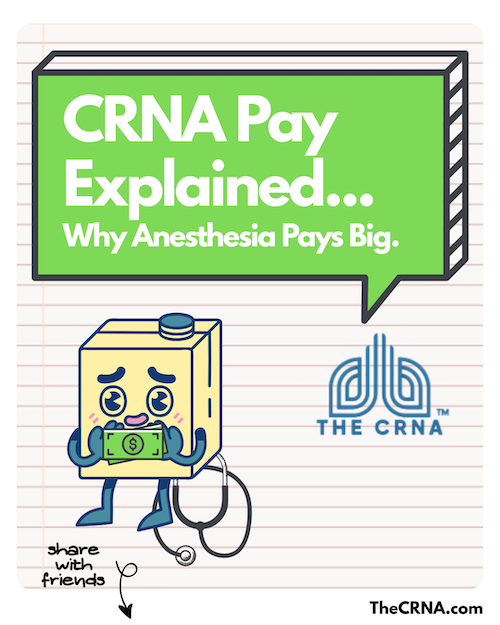CRNAs consistently rank among the highest-paid advanced practice providers, often earning double the salary of Physician Assistants and outpacing many Nurse Practitioners as well. While this sometimes sparks debate, the reasons behind CRNA salaries are rooted in healthcare economics, risk, and professional structure. Their pay reflects not just the hours worked, but the value they generate in the operating room, procedure suites, and beyond. Below are the key factors that explain why CRNAs make so much money, and why demand for their role remains strong.

Procedural Work Drives Revenue
- U.S. healthcare reimburses procedures far more than cognitive or preventative services.
- Every surgery requires anesthesia, making CRNAs central to hospital revenue streams.
- By keeping ORs running, CRNAs directly impact hospital profitability and are compensated accordingly.
High-Risk Clinical Responsibility
- Anesthesia involves life-or-death management of airway, blood pressure, and patient stability.
- CRNAs must be prepared for rare but catastrophic emergencies — risk levels that justify higher pay.
- This liability sets their work apart from typical outpatient or clinic-based roles.
Supply & Demand Economics
- A national shortage of anesthesia providers keeps salaries strong and recruitment competitive.
- CRNA programs are highly competitive and class sizes are small due to high academic and clinical workload.
- Growing demand from surgery centers, cath labs, and endoscopy suites increases reliance on CRNAs.
Independent Practice Opportunities
- In over 30 states, CRNAs can practice without physician supervision.
- Independent providers often bill directly and earn $300K+ annually.
- PAs and AAs lack this autonomy, limiting their earning potential by comparison.
Strong Professional Organization & Negotiation Power
- The CRNA profession has organized well to protect scope and negotiate pay.
- We do not have the saturation that drives down wages in other markets.
- This collective control gives us stronger leverage with hospitals and groups.
Pathway Experience & Clinical Maturity
- All CRNAs must have a BSN and ICU nursing experience (average 1-3 years) before even applying for CRNA school.
- CRNA programs are highly competitive, only the most capable ICU nurses advance, creating a workforce that hospitals know they can rely on in critical situations.
- By the time they graduate, CRNAs bring thousands of hours of bedside expertise, which commands higher salaries.
In the end, CRNA salaries aren’t about simple comparisons to PAs or NPs — they’re about the unique intersection of risk, revenue, and professional positioning. Hospitals and surgical centers depend on CRNAs to keep operating rooms open, patients safe, and revenue flowing. That combination of procedural skill, independence, and supply control ensures CRNAs remain among the best-compensated providers in healthcare. For those considering the profession, the investment of time and training leads to not only clinical autonomy but also financial reward that reflects the critical role they play.


